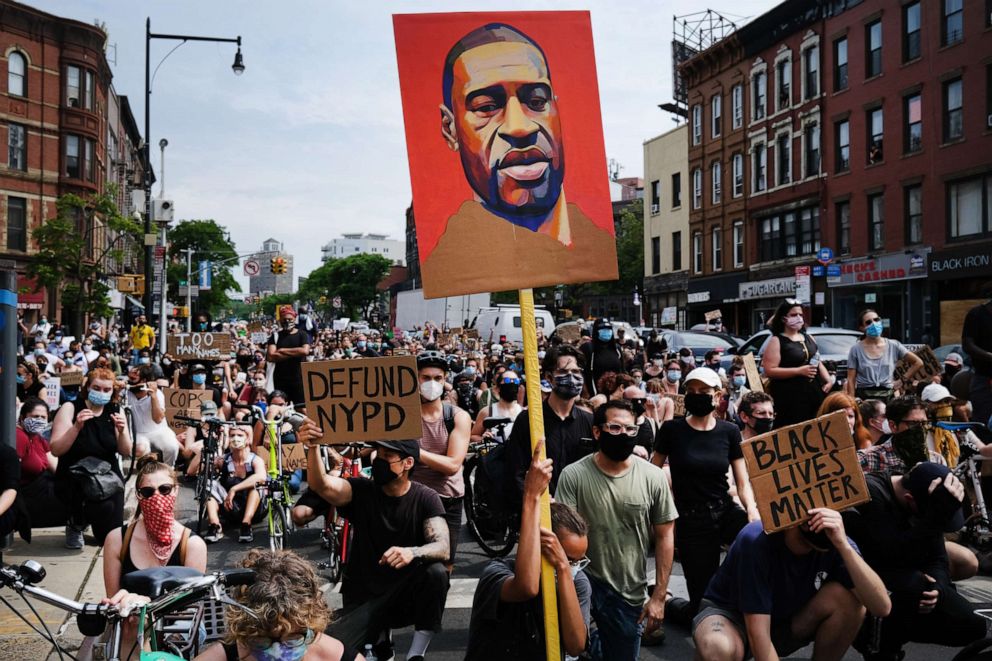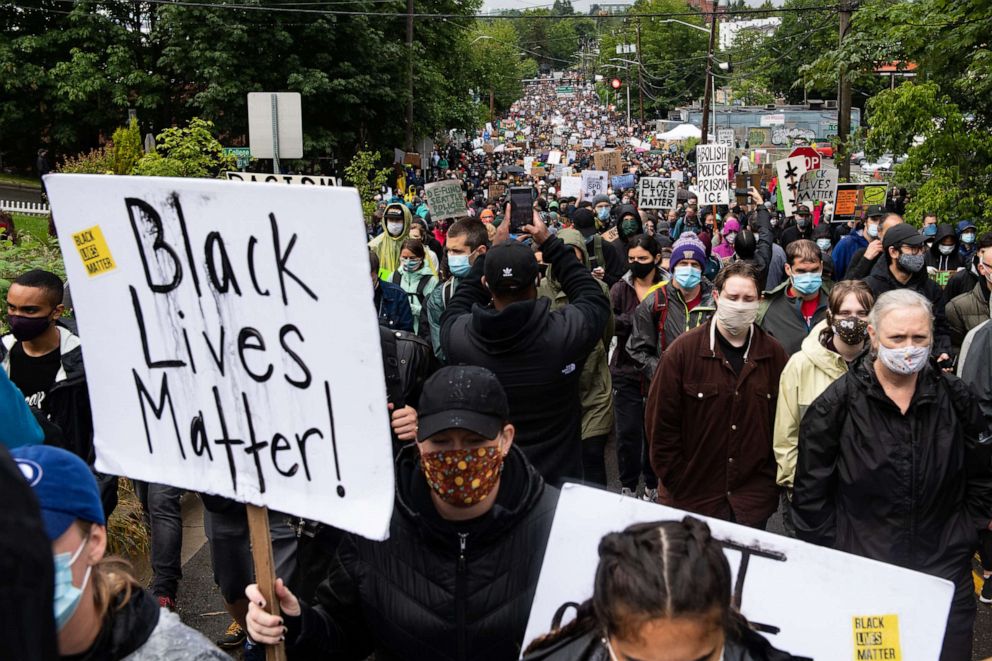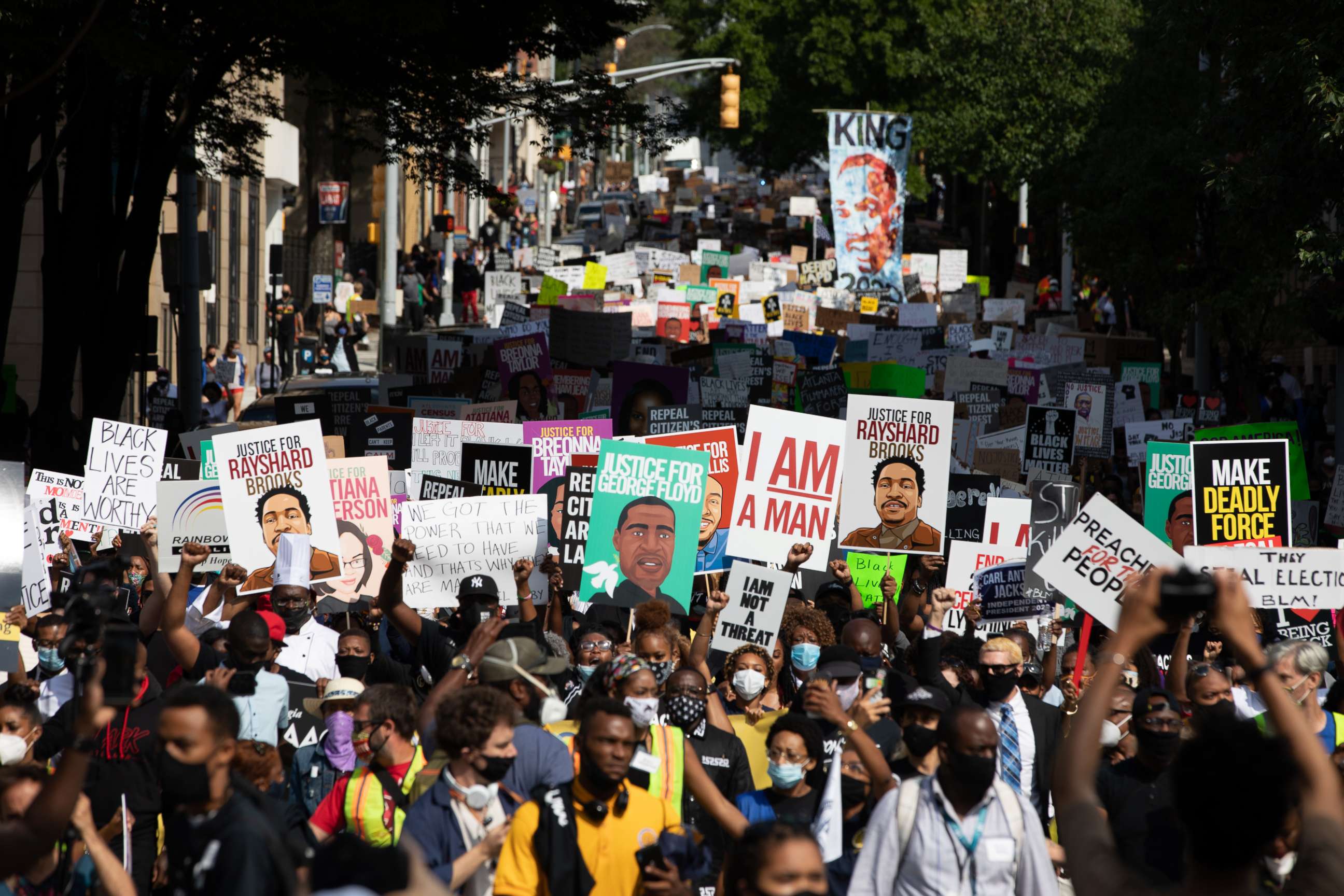As corporate America faces racial reckoning, here’s how experts say change can be made
"I'm cautiously optimistic that it is a tipping point."
Corporate America is facing a reckoning, reminiscent for some of the #MeToo movement, over renewed allegations of structural racism that emerged in the course of mass protests over the killing of George Floyd.
While predominately-white boards and C-suites have long been the norm in the private sector despite past efforts to make changes, the last few weeks have seen an exit of some corporate leaders over allegations of racism and widespread push to rethink the system that is in place.
Reddit co-founder Alexis Ohanian even voluntarily gave up his board seat to make room for a black board member.
"I’m cautiously optimistic that it is a tipping point," said Joseph K. West, a partner and the chief diversity and inclusion officer at the law firm Duane Morris. "The lines have really been blurred between what you see playing out in the streets and what you see playing out in the corridors of power."

Moreover, "those two disparate groups are actually communicating with each other at a policy level in a way that didn’t exist before," West said.
Despite long calls for diversity in corporate America, the state of affairs, especially at the top, remains dismal. Black CEO's make up just 1% -- only five out of 500 -- of the most recent Fortune 500 list of U.S. companies.
Black workers make up 7.8% of management roles in management, professional and related occupations, according to the Bureau of Labor Statistics’ current population survey. White workers make up 83.6% of those roles. Black workers are also grossly underrepresented in business and financial operations occupations, legal occupations and other “professional and related occupations,” according to the same data set.
While firms large and small have addressed the Black Lives Matter movement with marketing and social media campaigns, here is what experts say needs to happen to attempt to dismantle structural racism at the corporate level.
"The pledges of solidarity are a start at least acknowledging that there is an issue, and we're hearing these companies talk about structural racism and systemic issues, and even in some cases, white supremacy," Jamillah Bowman Williams, a longtime scholar of workplace inclusion at the Georgetown Law Center and the director of its Workers' Rights Institute, told ABC News. "You're calling these things out, but we want to make sure that there are concrete steps."
Understand and address biases and barriers that quell black talent
"A lot of what people came to understand from the George Floyd murder is the biases that exist out in society that can have a very meaningful impact on people of color, particularly African Americans,” West said. “Those same biases play out in the workplace at various junctures at every level.”
Biases at work can impact compensation, assignments, recruiting, mentoring, promotions and nearly every other decision in the workplace, according to West.
“There are biases that play out at each of those sorts of critical junctures in the career lifespan, and if you don’t get outside assistance ideally to help identify those barriers and come up with strategies to eliminate them, then you may have a problem,” West added.
Williams added that at work, many promotions and other opportunities to advance "happen very informally."
"You get this tap on the shoulder, you get certain people who are invited to join in to meet with top clients, for example, or to take on a prestigious assignment," she said.
"This normal sort of informal process leads to structural barriers where some people get opportunities and some don't," she added. "Even though it's not like some official policy that, ‘'Oh, we're going to hire or promote more whites because we think they're better,' but that in the end, ends up being what happens."

West and Williams say unconscious bias training can help tackle these issues.
Another part of the solution is just being aware of them, "and being aware of how that can favor some employees over the other and how it leads to this historic exclusion and lack of opportunities," Williams said.
When people are "aware of both unconscious bias and structural barriers and how they work together to perpetuate inequality, they can then reflect and really hopefully check their own bias," Williams said, both "individually and institutionally."
Create a culture of inclusion
According to West, the conversation about inclusion -- making sure diverse voices are heard and valued -- has been lagging in corporate America.
"We’ve had a lot of conversations about diversity, but not as much about the importance of inclusion and inclusiveness," West said.
"That’s important because a lot of organizations over the last couple of decades have done a decent job of recruiting diverse talent, but they tend not to stay,” he added. “Retention is an issue because people run into barriers to inclusion, they run into barriers to ascension.”
According to a report from this year on retention from the New York-based non-profit Catalyst, 35% of black professionals intend to quit their jobs within two years compared with 27% of their white counterparts.
“Stereotypes of people of color in the workplace contribute to a higher emotional tax burden for workers of color, in which these employees feel ‘on guard’ at work and may contribute to their intention to leave,” the researchers noted, adding that “inclusive leadership” can help reduce turnover.
Dr. Akilah Cadet, the founder of the diversity consulting firm Change Cadet, told ABC that this issue is "all about belonging."
"If you feel like you don't belong in a work environment and can't be yourself, if you don’t feel comfortable, there is only so much time that you can take to deal with that," Cadet said. "A lot of people are forgetting or underestimating that as black people, we have to learn how to live in a white country, in white spaces, we have to work twice as hard to get minimum respect.”
A non-inclusive environment leads to "a revolving door of people of color leaving, of black people leaving, because they won’t be able to relate to anyone or they will be tokenized and have to represent all of black people."
"America is designed for white people to be the best and be the top and there is a lot of historical context for that, that shift in dynamic is incredibly hard for white people," she said. "They don’t want to stop benefiting from white privilege in America."
"In order for us to get to a place of humanity and equality for black people, for that to happen, white people are going to have to lose some of their power," she said. "That is terrifying for a lot of white people."
Williams added that this experience at work is "often isolating."
"It’s alienating to be representative in that token number, and not feeling like you're actually valued," she said. "So you feel like you have to change yourself to fit in and some molds of this culture and you feel like you have to work twice as hard."
“For black people often when they make mistakes, it's associated with their blackness,” she added. "It's just used as an excuse or a rationale for why they weren't really worthy or deserving to be there in the first place.”
“The first time they make a mistake, which happens with all professionals then it's like ... it's used as a reasoning behind almost why they shouldn't have been there in the first place and black workers are very aware of this and they are worried about affirming these stereotypes," she said, noting that white people don't often have to fight these battles at work.
Changes here are going to have to come at a cultural level, the experts say.
“I am hopeful that things will shift and change, it will only come with more white people understanding their privilege and working to dismantle it," Cadet said. "First off, understanding their privilege, second step, learning how to become an ally."
For white and non-black people of color, this involves active listening and calling out situations where black colleagues may be talked over or ignored and "being able to have conversations with leaders about microaggressions that they see," Cadet said.
Push hard for transparency and accountability
If companies really want to enact change and dismantle issues of systemic racism that have plagued institutions for decades, they need to be transparent about their work and data and be held accountable.
Cadet said transparency in the breakdown of leadership and employees is a good start, and having that information in an easy-to-access place that is often updated -- such as a website with clear information about who you can contact.
If companies develop a plan to tackle diversity and inclusiveness, being able to have a point person to bring comments and complaints and "not be chastised by asking these questions,” is essential, according to Cadet.
Williams said that companies should be more transparent about their efforts "and create more dialogue and conversation about what works and what doesn’t, rather than being just so defensive."
"I think the tech industry is a great example of that. Because the media got involved, politicians got involved, customers got involved in really pushing them to start releasing the data," she said. "And they were resistant for years."

Williams also said it's important to push for specifics. If someone says they are doing unconscious bias training, ask, "What does your training look like? Does everyone have to do it?"
If diversity is good for business, it should be compensated as such
Finally, "if diversity is like any other business metric, then companies should reward" it as such, West said.
West cited an example at a tech firm where the leader "incentivizes his direct reports by withholding a certain percentage of their annual bonus if they don’t meet certain diversity and inclusion goals."
“You would be amazed how much that clarifies the mind,” he quipped.
"For me when you talk about diversity and inclusion from a corporate standpoint and from the standpoint of the C-suite, the most compelling argument is that, sure, eliminating barriers can be … good for the bottom line," he added.
Many studies have shown that diversity is ultimately good for business. A 2020 McKinsey report found that firms with ethnic diversity at the executive level were more likely to financially outperform those without.
"If that is the thing that convinces people that diversity in the c-suite is a good thing then so be it," West said.
Cadet added that many companies and brands are finally "understanding the value of the black dollar and the conscious consumer dollar."
Ultimately, "money is a wonderful precipice for cultural change," she said.




